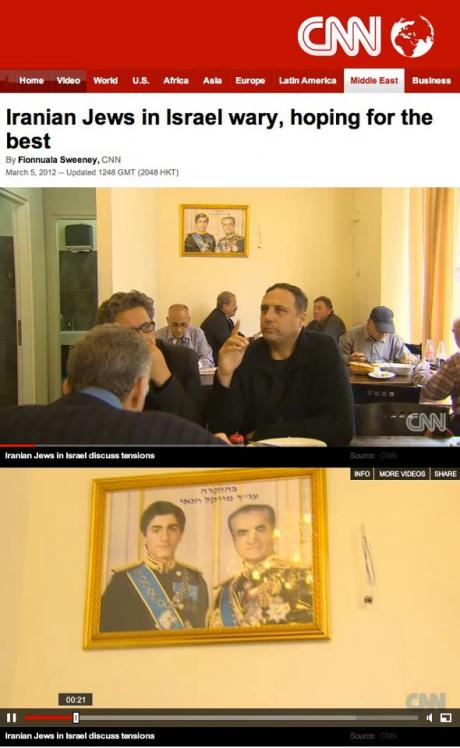
Shamshiri in Tel Aviv is as busy as any restaurant might be during the lunch hour rush. Nestled in a part of the market area known as Little Persia, Shamshiri is run by Jews from Iran, providing a home away from home for other Iranian Jews.
Iranian Jews in Israel wary, hoping for the best
By Fionnuala Sweeney, CNN :
****************************
****************************
ESTHER’s CHILDREN
****************************
****************************
Polish Refugees Leave Tehran (1944):
Fascinating footage shows 350 Polish refugees bidding goodbye to their friends and relatives and leave Tehran for Palestine at the Tehran railroad station. (March 27, 1944)
Polish Refugees Arrive in Iran (Persia) :
Refugees During WWII after their exode from Poland invaded by Nazi Germany. Amongst them were also Jews and Gypsies who were threatened by the Nazi Purification policy.
BBC Persian on Poles in Pahlavi Iran and the Iranian Bear Woltek:
Testimonies including the Adventure of Woltek the Persian Bear who fought alongside Polish Soldiers
Iranian Jews in Israel wary, hoping for the best By Fionnuala Sweeney, CNN
(CNN) — Shamshiri in Tel Aviv is as busy as any restaurant might be during the lunch hour rush. Nestled in a part of the market area known as Little Persia, Shamshiri is run by Jews from Iran, providing a home away from home for other Iranian Jews.
Moluk, the matriarch of her family, is just one of tens of thousands of Iranian Jews who immigrated to Israel during the course of the last 60 years. She arrived in Israel in 1964 from Isfahan, where her sister still lives to this day.
In Iran there are an estimated 25,000 Jews remaining in the country, making it the largest Middle Eastern population center for the religion outside of Israel. Moluk, like many Iranian Jews in Israel, still keeps in touch with relatives back home.
She says there are no problems between Jews and Muslims in Iran. Jews, she explains, can practice their faith freely in Iran and are not persecuted.
But for most in Israel, talk of Iran focuses on the country’s nuclear program and what the government here believes is Tehran’s drive to develop nuclear weapons. The Iranian government steadfastly maintains its program is peaceful in nature.
For Iranian Jews living in Israel, the debate about their homeland cannot be escaped and in their market community in Tel Aviv there’s a keen awareness of the potential for an Israeli strike.
Take Mansour, a spice shop owner. He came to Israel from Iran forty years ago. He says the Iran nuclear issue is a big mess, hard to understand with both Israel and Iran waiting to see who will act first.
There are between 100,000 and 200,000 Iranian Jews and their descendants in Israel, and despite the hostile relations between Israel and Iran, they’re still able to closely follow events in their country of origin through internet radio stations like Radis In which broadcasts from Tel Aviv.
One caller from Iran to the station says he won’t be voting in the country’s upcoming elections as he believes they will be rigged. Barouch Davidi, one of the station’s presenters, says that after hearing stories from other callers, he believes the economic sanctions are really beginning to hurt the Iranian regime.
It’s a view shared by analyst Meir Javedanfar, himself originally from Iran and who is now at the Herzliya Interdisciplinary Center college in Israel. He says the regime in Tehran is in danger because the economic price being paid for its nuclear program as a result of sanctions is actually “a bigger existential threat to the Islamic Republic of Iran than to the State of Israel.”
The sanctions are beginning to bite, says Javedanfar. A strike by Israel, he continues, should be only as a last resort. A strike, he argues, would be “bad for two reasons. Number one, it would help the longevity of the Iranian regime. Number two, it could motivate it more to build the bomb.”
Back at the restaurant, Moluk is not concerned about the tension over Iran’s nuclear program. “I don’t believe it,” she says. “It’s a bluff. We believe in good things. God told us to believe in the best.”
On her wall, as if a throwback to earlier and presumably better times for Moluk and before the creation of the Islamic Republic of Iran, hangs a portrait of the late Shah and his son.
Iranian Jews like Moluk and Mansour may be hoping for the best but preparing for the worst as politicians negotiate the future in the corridors of power, far away from this bustling Tel Aviv neighborhood.
Related Blogs:
HOLOCAUST REMEMBRANCE DAY:Polish refugees leave Tehran station for Palestine (1944)
pictory: “Poles Flee To Persia”, WWII News Reel (1943)
AN AXIS OF LOVE: A Persian Tribute to Poland’s Dignified Grief
Recommended Readings:
Director Khosrow Sinai film about Polish refugees in Iran World War II
Iranian Diaspora Intelligentsia Unite Against Islamic Republic’s Holocaust Revisionism By Darius KADIVAR
Tehran 43: Spy Ring by Darius KADIVAR
TEHRAN MON AMOUR by Darius KADIVAR






